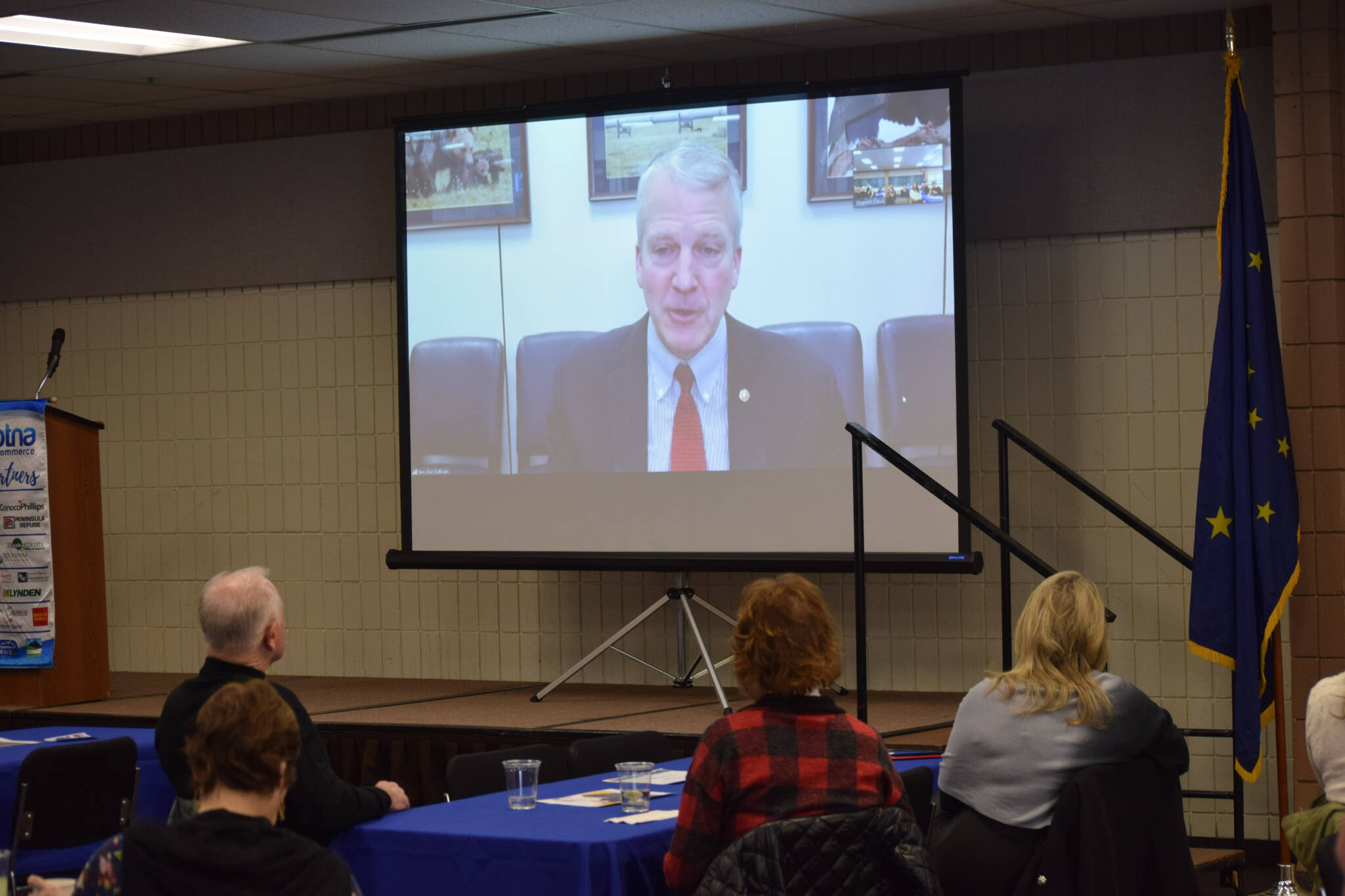Alaska Sen. Dan Sullivan on Tuesday spoke virtually with community members about legislation he’s working to pass in Washington, D.C.
The senator, who presented at a joint luncheon of the Kenai and Soldotna chambers of commerce, discussed the state’s economy, infrastructure, the pandemic, defense spending and voting rights, among other topics.
Infrastructure and energy
Sullivan emphasized his support for Alaska energy projects and criticized President Joe Biden’s “Build Back Better” infrastructure bill — which would combat climate change using clean energy technology like wind turbines and solar panels — stating that the framework directly targets Alaska.
The senator said he thought the bill would both shut down Alaska energy projects and start new social programs “that I think our country couldn’t afford.”
Alaska projects such as the Willow energy development project on the North Slope, Graphite Creek Mine project and the Donlin Mine project in the Yukon-Kuskokwim Delta region all face opposition from environmental groups, Sullivan said.
Instead, Sullivan said Alaska would benefit from a “hard infrastructure” bill in the works, which would seek to increase and improve roads, water, sewer and broadband internet access across the state.
“We are a resource rich but infrastructure poor state. We have less road miles than Connecticut even though we’re about 120 times bigger than Connecticut,” he said. “I have always been focused on — as your senator — is to be very, very, very focused on infrastructure.”
Sullivan also said the “hard infrastructure” bill he’d like to see passed would allow the state government to allocate funding as it sees fit.
“Most of the money actually goes to the state of Alaska, and then the governor and the Legislature figure out how to disperse the funds,” he said. “To me, that’s the best way to get funds to the people that need it most because our state legislators are much more knowledgeable than bureaucrats in D.C.”
National Defense Authorization Act
Sullivan spoke about his support for the budget outlined in the National Defense Authorization Act, which was signed into law last month.
He said the act will be a financial benefit to Alaska’s military while also expanding national security efforts.
The Ted Stevens Center for Arctic Security Study provision of the act, Sullivan said, will allow officials to study economic energy and national security issues in the Arctic. Another provision to the act — called the Arctic Security Initiative — focuses on the Arctic region as “a key area of national security” and “strategic priority for the Pentagon,” Sullivan said.
“There was a whole bunch of other things in that bill that we think were really positive,” he said. “And because we have so many veterans and so many military members, it’s always good to make sure we’re making progress in these areas.”
The senator also said Congress is “making big progress” on expanding Veterans Affairs facilities across the state.
Voting Rights Act
Sullivan expressed discontent with two voting rights bills — which have been passed in the U.S. House of Representatives but are experiencing a hold up in the Senate — stating that passing them would constitute “federal overreach.”
The John Lewis Voting Rights Advancement Act would restore parts of the Voting Rights Act of 1965 that required states with a history of voter discrimination to seek federal clearance to change voting rights laws, NPR reported this week. In addition, the Freedom to Vote Act would make Election Day a national holiday, allow more early voting and mail-in voting, require states to make voting more accessible to people with disabilities, and broaden identification requirements for voter registration.
Sullivan said he didn’t support passing the two bills as written. The bills, he said, would “federalize” the voting process.
“If you read the Constitution, that is a role for the state of Alaska. That’s a role for states,” he said. “We have some of the highest standards of any state in the country on voting rights. What I emphasize is we’re all different.”
Sullivan also criticized Biden for a speech he gave in Georgia last week calling on the Senate to end the filibuster on the voting rights legislation.
In his speech, Biden said the bills would get dark money out of politics and stop discriminatory laws before they go into effect.
On Tuesday, Sullivan said the president’s remarks were offensive.
“It’s based on a flawed assumption that somehow states like ours are restricting voters,” the senator said.
COVID-19
Sullivan said managing the pandemic has become more than just assessing the number of people who have contracted COVID-19 and emphasized the social and economic factors that have affected Alaskans in the past two years.
“Health isn’t just defined by whether or not you catch the virus,” he said.
The senator said local businesses have struggled, kids have had negative social impacts from studying at home, and opioid use is up in Alaska.
He commended former President Donald Trump’s administration for Operation Warp Speed and the roll out federal funds in the early days of the pandemic.
“Fortunately, we were able to undertake with CARES Act money and the Trump administration’s focus on Operation Warp Speed to get these effective vaccines in record time,” Sullivan said. “To me, the implication of health has to be broader than just the virus, it has to encompass everything. And that’s jobs, that’s economic security, and that’s our kids.”
Reach reporter Camille Botello at camille.botello@peninsulaclarion.com.

